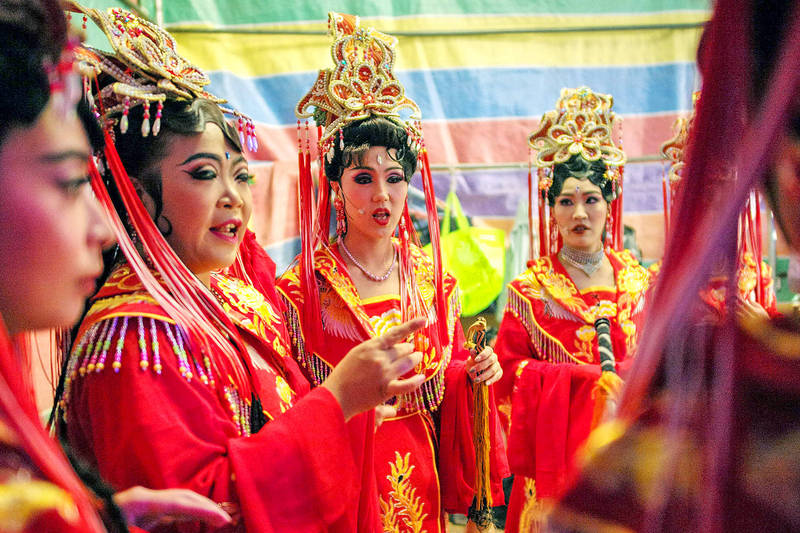《TAIPEI TIMES》 Hakka troupe strives to keep opera tradition alive

Members of the Jing Sheng Opera rehearse backstage during the first day of a Hakka festival at the Yimin temple in Taoyuan on Sept. 3. Photo: Sam Yeh, AFP
‘NICHE’ ART: While fewer people from younger generations speak Hakka, a performer said that she believed the traditional opera would survive
/ AFP, TAOYUAN
Dressed in a robe fringed with beaded tassels, traditional Taiwanese opera singer Jen Chieh-li (任潔儷) applies the final touches to her heavily painted face as she prepares to take the stage. The 34-year-old is a member of Jing Sheng Opera (景勝戲劇團), one of a handful of troupes in Taiwan still staging traditional dramas in the Hakka language.
Taiwan’s traditional Hakka opera, usually performed at religious festivals, dates back to the late Qing Dynasty and was brought to the nation by Hakka settlers from southern China.
Even as its popularity dwindles, Jen, who has trained at a drama school since the age of 12, said she would not give up the fading art.
“I could find a regular job, but it would be a waste of all the time and effort I have devoted to studying and performing Hakka opera,” she said.
That sweltering night in Taoyuan, Jen was performing Legend of the White Snake, a Chinese folk tale about a romance between a man and a serpent spirit. About 100 people — mostly of an older generation — sat on plastic stools to watch the show on a makeshift stage outside a temple in a reflection of Hakka opera’s struggle to capture the attention of a shrinking audience.
“It is a niche performance art as many people don’t even understand the language,” said Chiang Yu-ling (江玉玲), who founded the Jing Sheng Opera troupe with her husband, Lin Bao-mu (林保木), 19 years ago.
There are only eight Hakka troupes in Taiwan that are able to keep regular staff, albeit with financial support from the government and private sponsors, Chiang said.
She is counting on new blood, such as Jen, who is studying for a master’s degree in performance art, to help bring in more and younger audiences.
“My husband and I are in our 50s and we have limited ideas. We hope to get more young people on board ... to make Hakka opera more different,” Chiang said.
Hakka shares similarities with Peking opera, the most dominant form of traditional Chinese opera that has UNESCO heritage recognition, but language is one of the main reasons for Hakka opera’s flagging popularity. In Taiwan, Hakka make up less than 20 percent of the population, and even those within the community are no longer fluent in the language.
“My father’s generation speak mostly Mandarin already and I speak very little Hakka,” said Louis Lo, 30, who was accompanying his elderly relatives to the show. “The opera doesn’t appeal to young people due to the language barrier.”
To attract more fans, Jing Sheng’s troupe has incorporated modern elements into traditional performances.
One example is their update of a Chinese folk drama involving a dragon princess and her human lover, which now includes street dance sequences, pyrotechnical acts and acrobatics.
“We are getting the audiences to know Hakka opera through more innovative performances and hopefully they would also want to watch the traditional ones,” Jen said.
Despite their dwindling audience numbers, fellow performer Shih Yu-tsen (施侑岑), 31, said the art form “definitely won’t vanish.”
“There may be fewer Hakka operas, but people are nostalgic,” she said. “They will recall the past all of a sudden and they will want to watch it.”
Besides, a show ticket costs as little as NT$200 with student discounts, Jen said.
“We often say it just takes the same amount of money to buy [a cup of] Starbucks [coffee] to support traditional art, to keep it alive,” she said.
新聞來源:TAIPEI TIMES

Spectators watch a performance by the Jing Sheng Opera on the first day of a Hakka festival at the Yimin temple in Taoyuan on Sept. 3. Photo: Sam Yeh, AFP













